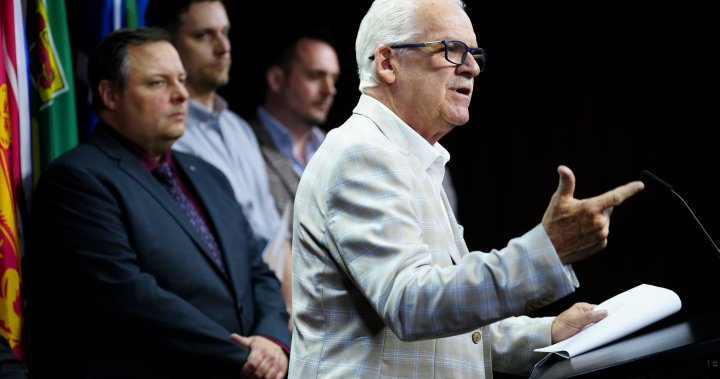Canada’s largest public service unions are threatening a “summer of discontent” after Ottawa mandated that federal civil servants return to the office three days a week.
“The Trudeau Liberal government better prepare itself,” Public Service Alliance of Canada (PSAC) president Chris Aylward warned at a news conference in Ottawa Wednesday.
The Treasury Board of Canada Secretariat, which is effectively a central nerve agency for federal departments, updated its policy last week requiring employees work from the office three days a week, instead of two, starting Sept. 9.

The unions – which represent 260,000 workers – call the decision “purely political” and have launched a series of legal complaints as well as “encouraging” members to file “tens of thousands of individual grievances.”
“Forcing hundreds of thousands of workers to needlessly now spend more money on transportation, childcare and other expenses is a move in the wrong direction,” Aylward said.
PSAC says its members are more productive working from home.
“They don’t have enough workspace or proper equipment to do their jobs effectively and spend their days on virtual calls with their coworkers, the same as they would if they were working from home,” said Aylward.
The email you need for the day’s
top news stories from Canada and around the world.
He says space will be even more limited with Ottawa planning to sell off some of its federal offices.

Aylward and other union leaders sent a letter to the New Democrats urging the party to reconsider its “stance” over the NDP’s agreement with the Liberals.
The New Democrats are propping up the federal government through a supply and confidence deal. NDP Leader Jagmeet Singh would not answer whether he’s prepared to back out of the agreement, which would effectively trigger an election.
“We have lots of tools [at] our disposal with the agreement we have, which allows us to put a lot of pressure on the Liberals. We’re going to use that pressure. We’re going to use those tools to stand up for working people,” said Singh.

Treasury Board President Anita Anand is not budging, saying the right to hybrid work is not enshrined for federal public workers.
“A hybrid work environment is not within the collective agreements,” Anand said. “The government of Canada retained prerogative to determine the scope.”
But PSAC says the government did not negotiate in good faith. A year ago this month, both sides reached a deal after a nationwide strike.
“Workers feel betrayed and we will be using every recourse we have available to fight this mandate and enforce a telework model that works for workers and not right-wing premiers,” Aylward told reporters.
Ontario Premier Doug Ford had called on Prime Minister Justin Trudeau to require federal workers to spend more time in the office to revitalize downtown cores.
Trudeau defended the mandate Wednesday saying it’s time to move “beyond the pandemic.”
“This is a reflection on the need to continue to deliver high quality services for Canadians,” said the prime minister.
Will the unions get public support?
Toronto resident Joseph DeLuca says he has no sympathy “at all” for federal public service workers and their campaign against the three-day-in-office mandate.
“I think government employees should work in government offices. People who work from home, I don’t believe, give you eight hours of work,” said DeLuca.
It’s a feeling echoed by Norm Chaykoski of Calgary who said he’s concerned about the wider implications.
“What about the general Canadian economy?” asked Chaykoski.
But Albertan Ryan Eaid, who works remotely, says he’s less productive in an office.
“If a job can be done from home, then it’s more efficient to do it from home,” he said.
Anita Kuparinen, of Toronto, calls the debate a “bit of catch-22.”
“I think they should have a choice, but at the same time we need those services as well… we need people in the office,” she said.
© 2024 Global News, a division of Corus Entertainment Inc.



